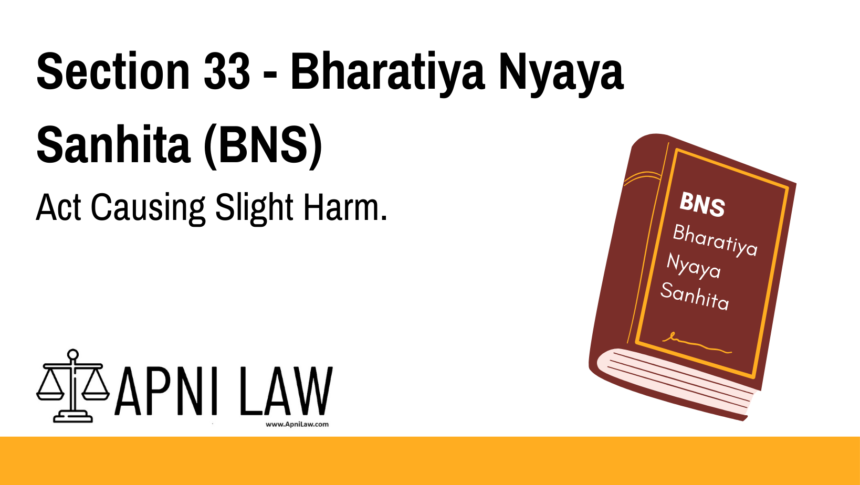Code: Exact Text of Section 33 BNS
Section 33 BNS
Nothing is an offence by reason that it causes, or that it is intended to cause, or
that it is known to be likely to cause, any harm, if that harm is so slight that no person of
ordinary sense and temper would complain of such harm.
Of right of private defence
Explanation of Section 33 BNS
Section 33 of the Bharatiya Nyaya Sanhita (BNS) provides an important exception in criminal law. It states that an act is not considered an offence if the harm caused is so minor that an ordinary person would not find it objectionable.
Key Provisions of Section 33 BNS
- Exemption from Criminal Liability
- If an act causes slight harm, it is not an offence under BNS.
- The intent or likelihood of causing harm is irrelevant if the harm is too trivial to complain about.
- Definition of Slight Harm
- Slight harm refers to insignificant injuries or minor discomforts that do not require legal intervention.
- The law relies on the perspective of an ordinary person to determine whether the harm is negligible.
- Protection Against Frivolous Complaints
- The provision ensures that trivial matters do not burden the legal system.
- Only acts causing substantial harm warrant legal consequences.
Illustrations
Example 1: Accidental Brush in a Crowd
A person walking through a crowded marketplace accidentally brushes against another person. Since the harm is minimal, Section 33 BNS applies, and no offence is committed.
Example 2: Friendly Pat on the Back
A teacher pats a student’s back to encourage them. If the touch is harmless and well-intended, it does not constitute an offence.
Example 3: Playful Push Among Friends
Two friends jokingly push each other while playing. Unless it results in serious injury, the act does not qualify as an offence under Section 33 BNS.
Example 4: Light Accidental Spill
A waiter accidentally spills a few drops of water on a customer. Since the harm is insignificant, there is no legal liability.
Common Questions and Answers on Section 33 BNS
1. What is meant by “slight harm” under Section 33 BNS?
Slight harm refers to trivial injuries or discomforts that a reasonable person would not complain about.
2. Does Section 33 BNS apply to minor injuries?
Yes, if the injury is so minor that an ordinary person would not take legal action, it falls under Section 33 BNS.
3. Can this section be misused as a defense in assault cases?
No, if the harm is significant or intentional, Section 33 BNS does not apply. Courts evaluate the severity of the act before applying this exception.
4. How does the law decide if harm is “slight”?
The decision is based on a reasonable person’s perspective. If most people would not complain, the act is considered trivial.
5. Does this section apply to property damage?
No, Section 33 BNS applies only to harm caused to a person. Damage to property falls under other legal provisions.
Conclusion
Section 33 BNS ensures that trivial harms do not lead to unnecessary legal disputes. It helps in filtering out insignificant complaints and allows the justice system to focus on serious offences. Courts apply this section based on a reasonable person’s perspective, ensuring fair legal outcomes.
For more legal insights, visit ApniLaw today! 🚀








